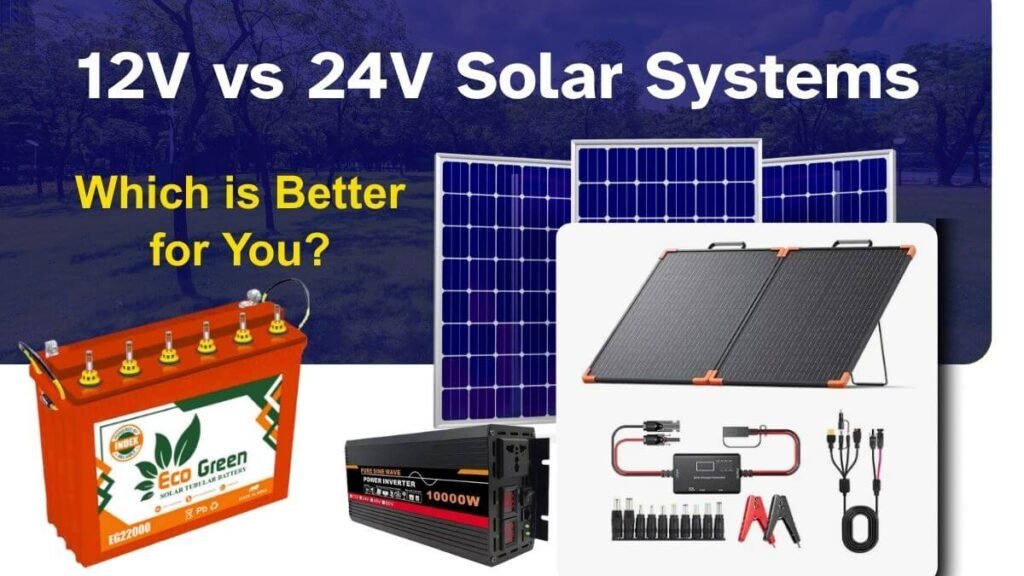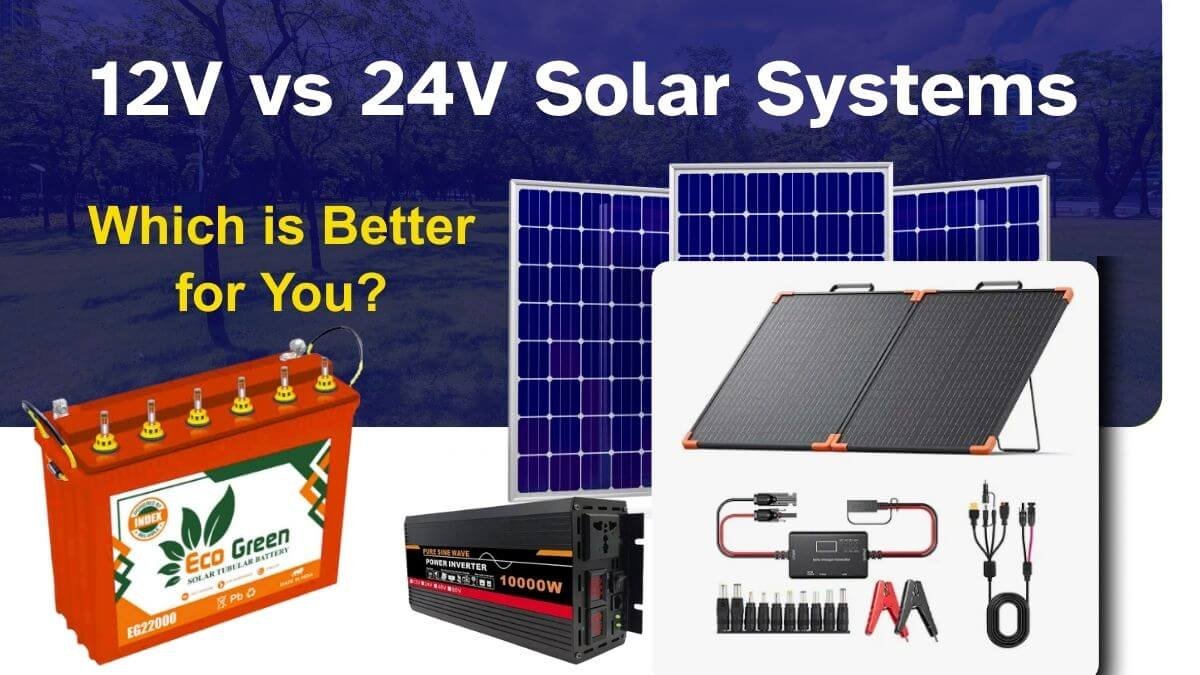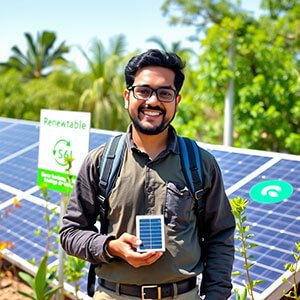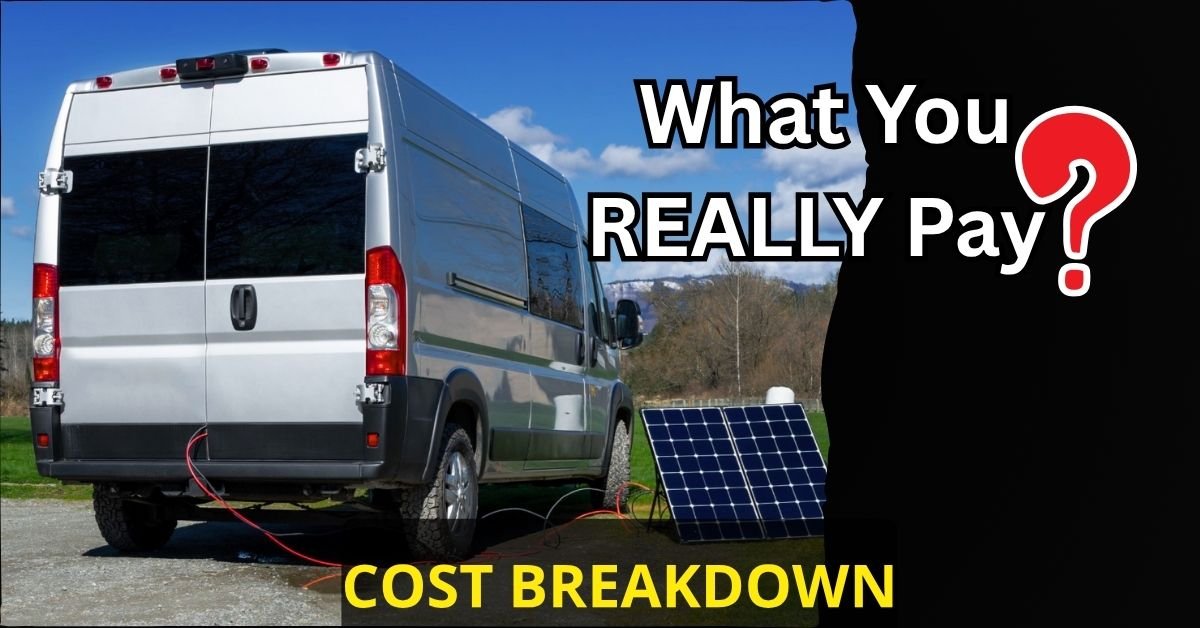12V vs 24V Solar Systems: Choosing the right solar system voltage can be confusing, especially if you’re new to off-grid living, RVs, or boats. Should you go with a 12V or 24V solar system? The answer depends on your energy needs, budget, and setup. In this guide, I’ll share the differences, pros and cons, and help you decide which system is best for your needs.
- Solar Cell Breakthrough Hits 33% Efficiency, Unlocking New Era for Clean Energy
- Van Solar Cost Breakdown: Complete Price Guide for Panels, Installation & Extras
- Emergency Power: Using Solar in Snow, Rain & Edge‑Case Conditions
- Solar Panels for Van Life: 2025 Buying Guide for Off-Grid U.S. Travel Power
- Van Solar Panel Installation: A Step-by-Step Guide
Voltage Basics in Solar Systems
Let’s clarify what voltage means in the context of solar energy.
Voltage is essentially the electrical pressure that pushes current through a circuit. In solar systems, it determines how much power your panels generate and how efficiently that power travels to your batteries and appliances.
Most small-scale solar systems operate at either 12 volts (V) or 24 volts (V). These voltages refer to the nominal voltage of the system, primarily dictated by the battery bank configuration. Choosing the right voltage affects:
- Wire size and cost
- System efficiency
- Scalability
- Compatibility with devices and inverters.
Now let’s explore the pros and cons of each system in detail.
12V vs 24V Solar Systems: Which Voltage is Better for You?
Understanding the differences between 12V and 24V solar systems helps you make an informed decision. Let’s break them down.

✅ Pros & Cons of 12V Solar Systems
12V systems are the most common, especially among beginners and mobile setups. They’re simple to install and have widespread compatibility.
✔ Pros:
- Compatible with most RV, van, and boat appliances
- Easier to find 12V batteries, inverters, and charge controllers
- Lower upfront cost
- Great for solar setups under 1,000 watts
- Easy to scale gradually for beginners
❌ Cons:
- Higher current for the same power output (leads to energy loss)
- Requires thicker, more expensive wires for long cable runs
- Less efficient for systems over 1kW
- Not ideal for powering high-wattage appliances
✅ Pros & Cons of 24V Solar Systems
24V systems are typically found in larger or more permanent installations. They provide higher efficiency and are better for powering more demanding loads.
✔ Pros:
- Lower current = less power loss over distance
- Uses thinner, cheaper wires (saves on material costs)
- More efficient for 1kW+ systems
- Ideal for off-grid homes, cabins, and backup systems
- Smaller battery banks are needed for same capacity
❌ Cons:
- Fewer compatible appliances (most DC devices run on 12V)
- Requires step-down converters for 12V devices
- Slightly more complex to set up
- Components can be more expensive and harder to find
When to Use Which System
Choosing between 12V vs 24V solar system comes down to how much power you need and what devices you’re running.
| Scenario | Recommended Voltage | Why? |
| Small RV, boat, or camper | 12V | Simple, affordable, and compatible with most DC devices. |
| Off-grid cabin with moderate power needs | 12V or 24V | Depends on distance and appliance types. |
| Large home, high-power appliances | 24V (or higher) | More efficient for heavy loads and long wire runs. |
| Solar-powered workshop | 24V | Better for running power tools and machinery. |
Quick Tip:
If your system is under 1,000 watts, 12V is usually fine. For anything larger or permanent, go with 24V for better efficiency.
Compatible Devices for Both Systems
Here’s what commonly works with 12V and 24V solar systems:
🔹 12V Compatible Devices:
- RV refrigerators
- 12V LED lighting
- USB chargers and phone adapters
- 12V inverters (for AC power)
- Marine appliances
🔹 24V Compatible Devices:
- High-wattage inverters (2000W+)
- Residential solar inverters
- Larger charge controllers
- Whole-house backup batteries
- Industrial DC appliances
🛠 Note: If you use a 24V system but need to power 12V devices, a DC-DC converter can bridge the gap safely.
❓ People Also Ask
Q: Can I mix 12V and 24V components in the same solar system?
A: Not directly. Doing so can damage your components. Use voltage converters or ensure all parts match the system voltage.
Q: Is 24V always more efficient than 12V?
A: For large systems, yes. 24V systems carry current more efficiently, especially over long distances.
Q: Are 24V batteries more expensive than 12V?
A: Typically, yes! But you may need fewer of them for the same energy capacity, which can balance the cost.
Q: Can I upgrade from a 12V to a 24V solar system later?
A: Yes, but it may require replacing some components like the charge controller and inverter.
Q: Are there 24V appliances available?
A: Yes, though they’re less common than 12V options. Many modern inverters allow you to run standard 120V appliances.
Q: Does a 24V system produce more power than a 12V system?
A: Not necessarily. Power (watts) depends on both voltage and current. A 24V system just handles higher power more efficiently.
Q: What size solar system do I need for my RV?
A: Most RVs function well with a 12V system of 100W-300W, depending on usage.
You can read: DIY Solar Shed Lighting System: Cheap & Easy Setup Guide.
Final Thoughts,
Which Is Right for You?
The 12V vs 24V solar system debate ultimately comes down to your energy needs, budget, and long-term goals. For small, mobile, or temporary setups, 12V systems offer simplicity and affordability. But if you’re planning a larger, permanent installation or want room to grow, a 24V system provides greater efficiency and flexibility.







